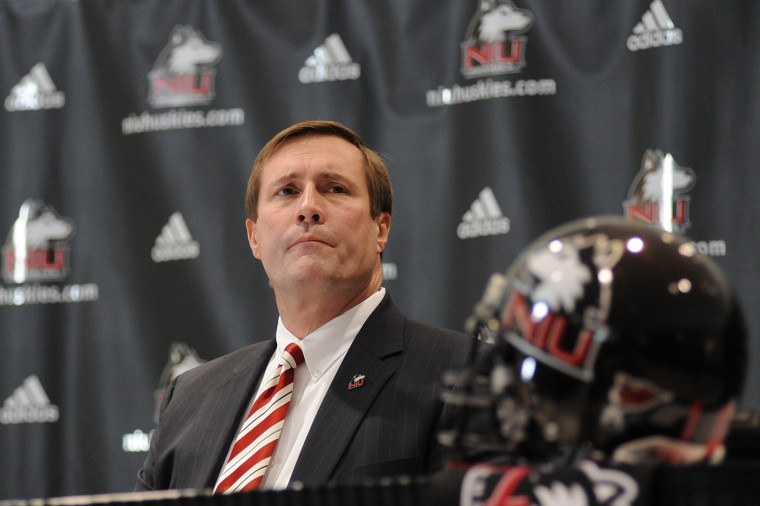NIU plays in bowl game, wins and profits
NIU athletic Director Jeff Compher says that financial considerations never factored into the Huskies’ bowl decision after the university made a $50,097 profit from playing in the uDrove Humanitarian Bowl on Dec. 18.
April 20, 2011
Debra Boughton, director of NIU’s athletic business affairs, received a puzzled look from NIU Athletic Director Jeff Compher when she handed him the athletic expense report from the football team’s trip to the uDrove Humanitarian Bowl.
Following losses of $154,125 and $271,125 in its last two trips to bowl games respectively, NIU came back from the Humanitarian Bowl with $50,097 more than it went with. The two biggest differences between the Humanitarian Bowl expense report and past games’ is the bowl payout and fewer expenditures leading up to the Dec. 18 game.
“Earlier date, less expenses at home, and a lot more money from the conference for our allocations,” Compher said. “We kept our budget and expenses relatively similar to previous bowls.”
NIU received $475,000 as an expense allowance from the MAC, and only spent $424,903. Unlike many bowls, the Humanitarian Bowl simply gave NIU a lump sum of cash instead of allotting the university a certain amount of tickets that it was responsible for. In that case, NIU’s revenue would have been contingent on how many tickets it could sell. In 2009 the Huskies were held accountable for $420,000 of ticket costs after the Independence Bowl.
The GoDaddy.com Bowl in Mobile, Ala. is the other MAC tie-in bowl that operates like the Humanitarian Bowl. Instead of relying on other schools to drive ticket sales, both bowls rely on the local area to purchase tickets.
Compher believes the MAC has made a concerted effort to see the financial side through the eyes of the schools.
“When you are looking at Boise, it’s difficult for our fans to go, and our conference realizes that,” Compher said. “It’s the same thing with the Go Daddy Bowl. The conference built in a safety net for teams making those trips and it’s a good thing.”
The only MAC bowl that leaves it up to the university to drive revenue through ticket sales is the Little Caesars Pizza Bowl in Detroit, Mich. While that game would have drained NIU’s funds, Compher still would have preferred to be in Detroit.
“I want to participate in all three of the MAC’s bowls,” Compher said. “Especially since the Little Caesars Bowl game sends our conference champion.”
In addition to the allowance, the Huskies took advantage of the Humanitarian Bowl’s Dec. 18 date. Only two weeks removed from the MAC Championship game in Detroit, NIU was able to save on lodging and practice expenses leading up to the game. The previous year, however, the Huskies played two calendar weeks later on Jan. 2 in the International Bowl in Toronto, Canada. Not only were the Huskies concerned with longer lodging fees, but the payout from the International Bowl was $200,000, which is $275,000 less than what the Huskies received from the Humanitarian Bowl.
Most of the financial planning is done before any bowl announcements are made, but it still isn’t hard for Boughton to say which one of the two bowl games was simpler for NIU to prepare for.
“We joked about how soon [the Humanitarian Bowl] was,” Boughton said. “It was kind of nice to have it so solidly done, and then four or five days later, we were traveling out to the game. It just turned out logically that we didn’t spend more than the $475,000.”
Though circumstances make it appear that Compher chose the Humanitarian Bowl for its financial possibilities, the athletic director doesn’t look at it that way.
“That didn’t really enter into it,” Compher said. “From our perspective, we were prepared for any bowl that our conference was aligned with. With a coaching change, to me that made more sense, and I appreciated the fact that it was sooner, but it wasn’t a factor in anything we were hoping for.”







